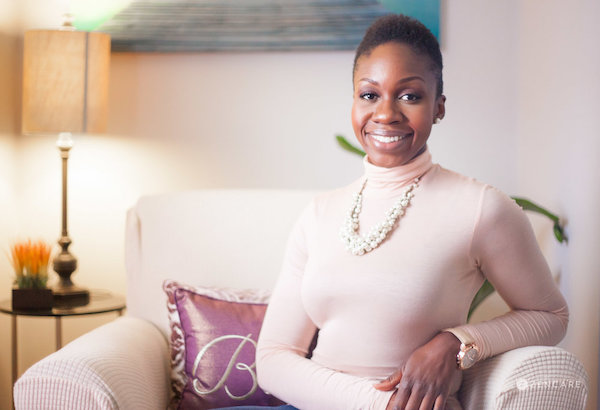When a prospective client requests an initial call with you, it’s a clear sign they’re highly motivated to learn more about your practice and potentially schedule an intake appointment.
It’s up to you to make the last step in their therapist search process as easy as possible and assure clients they’ve come to the right place!
We asked Monica Nastasi, LCSW, and Dawn Adeyemi, LICSW – both of whom have high conversion rates for their private practices – to share their processes for encouraging more initial calls to become in-person clients.
Read on for a peek into how Monica and Dawn guide their first calls with clients!

How Monica Nastasi, LCSW introduces herself to clients
Monica Nastasi is a Licensed Clinical Social Worker in Brooklyn, New York
Q: What do you first ask on an introductory call with a potential client?
When I call a potential client at their requested consult time, I first always double check with them when they answer the call that this is still a good time for them to talk, and if they can hear me okay. I want to make sure they are feeling comfortable and prepared before we begin.
Then, I ask the potential client if there is any specific way they want to use the time, and if they have any particular questions they'd like to ask me.

Q: What’s the typical flow of your introductory calls?
Potential clients typically ask me to talk about my approach (even though they've already read my profile and watched my video).
After asking about my general approach, they sometimes specifically want to know how it will work with their presenting symptoms or issues.
Q: How do you answer “Can you tell me about your practice"?
I start by asking them if they know much about different psychotherapy approaches, or if they are completely new to the world of therapy. This will help guide my response.
If clients already know about different types of therapy, I will talk more freely and briefly about them.
If clients are completely new, however, I will describe and explain with less "therapy jargon," and more detail. I tell them about my cancellation policy, fees, session length, requirement for weekly sessions, etc. I will also talk about what to expect in the first few sessions.
Related: 6 Steps to Turn Referrals Into Clients
Q: What’s your response when a client tells you what they’re going through, and/or why they're seeking therapy?
I try to remain empathic, without encouraging too much talk about their symptoms or reasons for seeking therapy. A typical response might start with “thank you for sharing,” before continuing to learn a brief overview.
I want to be sure working with them will be in my scope of practice. However, I don't want to get into having a therapy session on the phone! I guide them to asking me questions, more than me asking them details about their presenting problems.

Q. Do you think there’s anything that makes your approach to calls unique, and/or gets clients excited to book with you?
I think that many clients are excited to potentially book with me before the consult. I think that them connecting to my profile and video is the most important part in the process of them choosing me as a therapist.
I imagine that the consult helps them feel a bit more connected to me as a real person, to get a quick sense of my energy and confidence in helping them, but I don't think I say anything on the phone that they didn't already read on my profile. (I might be wrong though – you'd have to ask them :)
Q. How do you discuss fees with clients? And insurance?
I am very clear and upfront about my fees with clients. I do not take insurance but I explain to them how out-of-network benefits work.
I might say something like “My fee is $175 per session, and while I’m not in-network with any insurances, I do provide statements to my clients on the last day of each month. With their out-of-network benefits, most clients are able to be at least partially reimbursed for therapy.”
Note: For clients looking to navigate out-of-network benefits, please feel free to share the Zencare step-by-step guide to out-of-network benefits!
Q. How do you typically end the call?
I typically end the call by asking if the client would like to book their first in person session.
If so, then we go ahead and book. I have my calendar ready. Even if they need to reschedule, it’s great to have something lined up just in case.
I send them directions after our call, via email, as well as an appointment confirmation and reminder about my 48 hour cancellation policy.
If the client isn’t quite ready to book, or isn’t a fit for my practice, then I wish them well and let them know they are free to reach out in the future should they choose.
How Dawn Adeyemi, LICSW helps clients learn about her practice
Dawn Adeyemi is a Licensed Clinical Social Worker in Cranston, Rhode Island.

Q: What do you first ask on an introductory call with a potential client?
I ask why they are seeking counseling, and whether their symptoms are interrupting their functioning in any way.
I then follow up with questions about their insurance, and request information to verify their benefits and eligibility.
I also ask if they are currently in treatment and whether they are prescribed psychotropic medication. I like to make sure my practice is a good fit for them.
Q. What’s the typical flow? / What do potential clients typically want to talk about?
By phone, potential clients are interested in getting started right away.
They typically do not have questions for me and have said they really liked my introductory video listed on Zencare.
We quickly discuss their reason for interest in treatment and then plan our first in office session.
Q: How do you answer “Can you tell me about your practice"?
I describe the treatment interventions that I prefer to use, and how they can be effective in treatment.
I also explain that everyone's progress in treatment is subjective, meaning I am flexible and prefer to identify the most effective intervention for them to meet their therapeutic goals.
Q: What’s your response when a client tells you what they’re going through, and/or why they're seeking therapy?
I validate their concerns, and typically say "I would be happy to support you in addressing _____."
If I believe they may benefit from a higher level of care or a practitioner with a specific specialty, I will refer them.

Q. Do you think there’s anything that makes your approach to calls unique, and/or gets clients excited to book with you?
I have been told that I sound "pleasant" and "friendly" on the phone. I approach the call as if I am talking with a friend. I understand that seeking therapy can be uncomfortable for some and I want to help them feel at ease as well as encouraged for seeking support.
Q. How do you discuss fees with clients? And insurance?
Since my information regarding fees and insurance is listed on my site, it’s easy to discuss as they are already clear about their options.
I hardly receive calls from those who do not carry the insurance I take, or do not intend to pay out of pocket.
However, after confirming, if I do not take what they have, I suggest a few ways to find a therapist that takes their insurance.
Note: Therapy seekers can search for their insurance on Zencare under the “Payment Options” tab.
Q. How do you typically end the call?
With pleasantries! If it’s a fit, we schedule our first session, and I tell them what they can expect when they come to the office.
I’ll also follow up via email with the final details of my intake packet and directions to my office.